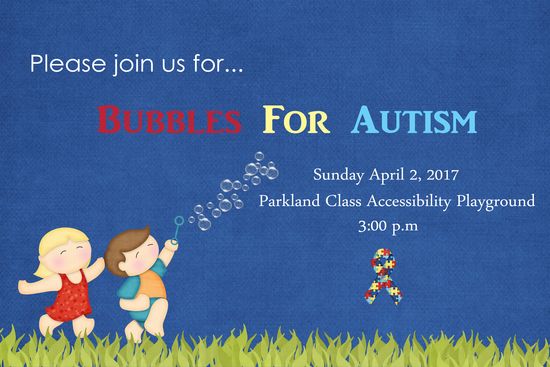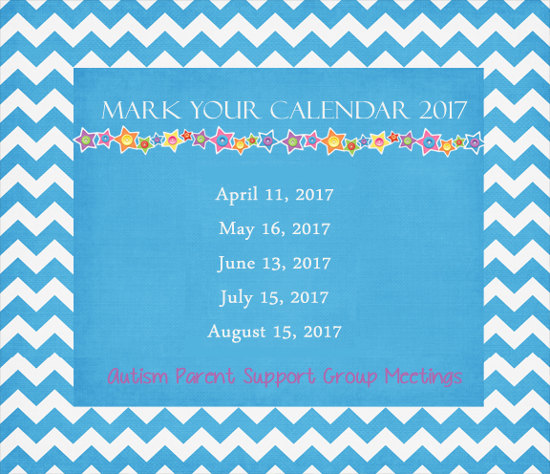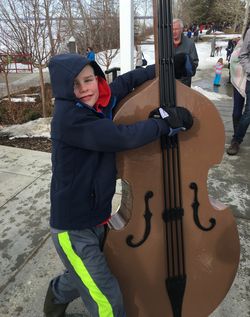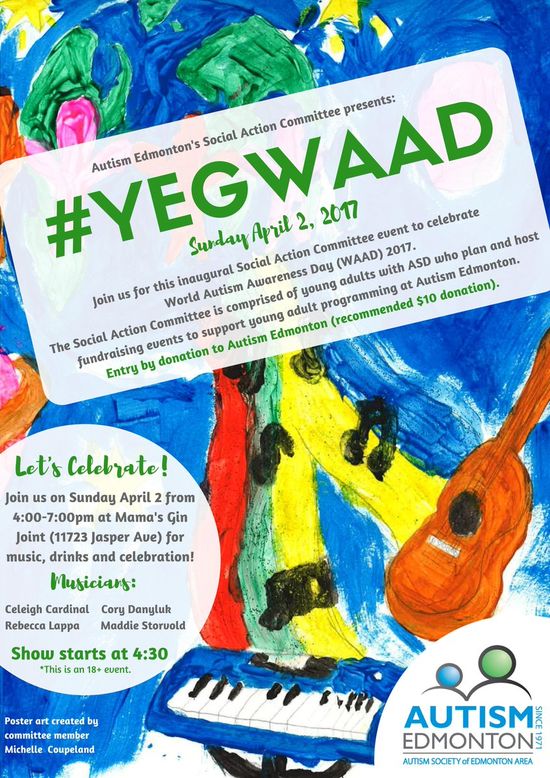Hardly Eating Anything!
 Can you count on one hand the foods your child will eat? Perhaps your family has concerns about nutrition. Maybe your child’s weight is below average as a result. I went through the very same thing with Eric when he was younger, and still have to prep him when I want him to give a new food a chance.
Can you count on one hand the foods your child will eat? Perhaps your family has concerns about nutrition. Maybe your child’s weight is below average as a result. I went through the very same thing with Eric when he was younger, and still have to prep him when I want him to give a new food a chance.
There are so many strategies I’ve used over the years. Today let’s just concentrate on one strategy: make food a play thing! Invent a lot of play opportunities that involve food, when there is NO pressure to eat. This is not done at meal time, and maybe not even at the table where you normally eat, but in places in your home that are associated with fun.
For some people with autism, part of the problem is that they need to build up trust and confidence with food. Meaning, they need to have many experiences with food so that they slowly learn to cope with the overwhelming input that comes through their senses. In this way, you help to prevent them from feeling the overpowering fear and stress they may associate with food, and therefore increase their interest and comfort in eating other things.
Don’t tell them what to do in the activities; show all the ways you can think of participating, by doing it yourself. Be expressive with your words and your facial expressions. Show by example that you can touch the food, smell it, lick it, put it some on your nose or chin and laugh. Lay cooked spaghetti over your head to make long hair.
You can do an internet search and find LOTS of ideas, but here are some examples of activities to get you started:
Draw/paint with food using your fingers on a cookie tray. Try using pudding, thickened tomato sauce, condensed cream soups (don’t add water), yogurt, condiments (ketchup, mustard, mayonnaise), etc.
- Make mountains out of thick mashed potatoes, perhaps with gravy to make lava for a volcano.
- Make faces or create pictures with a variety of food on a cookie tray or cutting board (could be veggies, fruit, rolled up sandwich meat, shrimp, even fruit salad – use your imagination).
- Use whipped cream or Cool Whip like shaving cream. Look in the mirror and put on a beard like Santa Clause (or some other person they know with a beard) and then let them shave it off using a small, stiff piece of waxed cardboard (cut up old greeting cards?), or anything safe that has a straight edge.
- Find the treasure: put small items of special interest to your child (e.g. plastic dinosaurs or cars, marbles, plastic characters, marbles, numbers or letters, etc.) in a small-to-medium-sized plastic storage container (transparent, if you have one). Fill it up with food, e.g. cooked pasta (cooked firm, with a bit of butter so it doesn’t stick together), cooked porridge, cubed jello, cooked rice, etc. Then mix up the food and the ‘treasure’ and let them find it.
- Cold play: provide a bowl with some plain ice cubes in it. As an alternative, freeze berries in the ice cubes for added interest. Provide other frozen foods for finger play or art, like French fries, frozen vegetables or fruit, popsicles, ice cream, etc.
- Warm play: some of the activities above can start out as warm play, such as the Find The Treasure game (when using cooked pasta, rice, or porridge), or the mashed potato mountain-building activity.

Most important to remember at all times: this is for fun, with no pressure or expectations of eating, touching or tasting. Keep fun in your heart, on your face and in your voice while doing these food games. Watch your child’s face for signs of joy, relaxation and laughter. And when you least expect it, the joy will be on your face when he actually eats a new food!
Kitty is the mother of a son with severe autism, a former special needs educational assistant, a Director of Autism Society Alberta, and the owner of Autism Inspirations.
Bubbles for Autism in Red Deer
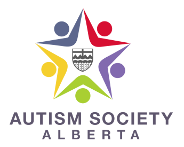
Central Alberta Parent Support Group Meetings

G.H Dawe Community Center, Red Deer
6:00-8:00 pm
Into Adulthood
 I was a headstrong youth, and my feelings were easily hurt from misunderstandings caused by ASD, misunderstandings that were further exacerbated by my ODD (Oppositional Defiant Disorder). For me, becoming an adult was like going to the movies expecting to watch The Shawshank Redemption, and instead being treated to Regarding Henry. Both are okay (though one is superior in almost every way), but it’s unexpected, and jarring. I was warned, as every teen will be, about the trials and tribulations surrounding adult life, but my arrogance prevented me from listening. I remember my parents sometimes exclaiming that it was like talking to a wall. I would shut down when being offered advice – I just didn’t want to hear it.
I was a headstrong youth, and my feelings were easily hurt from misunderstandings caused by ASD, misunderstandings that were further exacerbated by my ODD (Oppositional Defiant Disorder). For me, becoming an adult was like going to the movies expecting to watch The Shawshank Redemption, and instead being treated to Regarding Henry. Both are okay (though one is superior in almost every way), but it’s unexpected, and jarring. I was warned, as every teen will be, about the trials and tribulations surrounding adult life, but my arrogance prevented me from listening. I remember my parents sometimes exclaiming that it was like talking to a wall. I would shut down when being offered advice – I just didn’t want to hear it.We Want to Hear From You!
What My Child with ASD Teaches Me
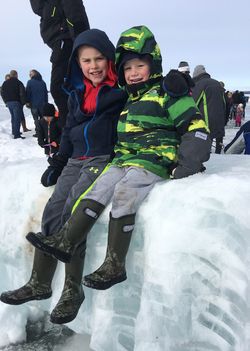 It feels like I am always working on skills and teaching with Conor, so I finally decided to pause for a bit and just observe. That’s when I realized that he teaches me just as much as I teach him, if not more.
It feels like I am always working on skills and teaching with Conor, so I finally decided to pause for a bit and just observe. That’s when I realized that he teaches me just as much as I teach him, if not more.Here’s what I have learned:
To be more patient.
It always seems like I am in a hurry to get things done or move onto the next item on that never-ending to-do list. Conor’s auditory processing has taught me to stop, slow down and to be fully present in the moment. It is amazing the difference it has made. He is so much more willing to tell me things because of this.
Just to listen.
I’m always aiming for conversation skills, and that means a lot of prompting on my part. Just listening and not interrupting, but gently re-directing him, has allowed us to have wonderful two-way conversations. He is so much more willing to share things with me than before, and I am learning so much about him. He even tells me snippets from his school day – something I have waited a very long time for!
Just to observe.
Standing back and watching him build Lego, draw a picture, or read a book lets me see how far he has come and learn more about him. I always make sure to compliment him at the end, and he is so keen to show me further projects!
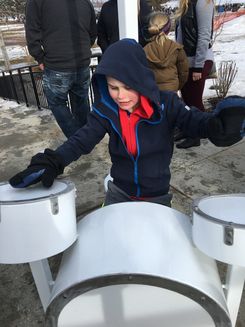
Things may not happen in the time frame that I expect them to, but that does not mean they are not going to happen. This year he is talking about friends at school, and that is huge! He has found a wonderful group of kids who know and accept him for who he is.
The feeling of 100% pure love.
Conor was never one to show emotion or express affection. Now he shows it to his brother, his Dad and me. To have a bear hug and a kiss from him and hear “I love you” just makes my heart soar!
Set realistic goals.
When doing this I always have to ask myself: is this a goal primarily for me or for Conor? And most importantly, is he capable of achieving it?
The sky is the limit!
When I look back at where we were two and a half years ago, I could never have imagined he would have come this far. School, relationships, becoming more independent – all have progressed further than I ever expected.
Never give up.
Oh yes, we have lots of regression, but after that comes progress – and it makes everything so worthwhile.
Being Conor’s Mum has made me a much better person, parent and friend. Thank you Conor, for the gift of you.
Finding My Place
 Three days ago, I finished moving out of my house. It wasn’t an easy move – I had lived there for a few years, and it had become my home. The house happened to be in Manila, the capital of the Philippines, where I have lived for a good part of my adult life. Moving out of the house represents the end of my life in the Philippines, at least for now. But it also means the end of a great, semi-failed experiment – my experiment in being an adult.
Three days ago, I finished moving out of my house. It wasn’t an easy move – I had lived there for a few years, and it had become my home. The house happened to be in Manila, the capital of the Philippines, where I have lived for a good part of my adult life. Moving out of the house represents the end of my life in the Philippines, at least for now. But it also means the end of a great, semi-failed experiment – my experiment in being an adult.
At the age of 29, with that big thirtieth birthday ominously approaching, I embraced the idea of becoming a real grown-up – someone with a house full of stuff. I wanted to be a person with thoughtful hobbies, someone who spends his Friday nights at home hosting dinner parties for friends. I even got two dogs to complete the trappings of adulthood, although somewhat by accident: the first one, Bop, came into my life as part of a "package deal" when I rented a house in another part of the country – a house she had been, quite pitifully, guarding while it was unoccupied. I couldn’t bear to give her up, and I soon adopted a second dog, Chichi, so Bop could have some company.
So finally, I felt like an adult. I played with my dogs, planted a garden, cooked a lot, practiced guitar and keyboards, and worked on my writing. For the first time, I owned my own furniture and appliances. I even ended up having a female friend move in – a platonic one, but a very close friend nonetheless. I loved cooking with her and spending lazy Sunday afternoons with her at home. Unfortunately, she invested too much in me emotionally, and after a while she became incredibly frustrated as she hit up against the limits of my ability to feel and express emotion. I wanted companionship, but felt incapable of offering any of the things that usually go with it. She moved out after a few months.
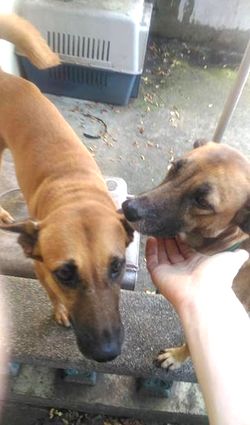
I kept my domestic routines and regular errands around the neighbourhood going, and as a creature of habit, I found them very comforting. But the house and the dogs became tiring to take care of by myself, and not having regular company to go along with my routines made it feel more hollow. As time went on, my adult life felt like it was just holding me back from traveling and going to places where I could figure myself out from new angles – not just from the perspective of a domesticated homebody. For these and other reasons, I eventually found a friend whose house luckily needed furnishing, and another who will take care of the dogs for a few months until I find permanent homes for them – even if that means taking them back to Edmonton with me when I visit home in June. After all, they’re still my babies!
In my twenties, I tried to do the whole free-spirited party animal thing, and eventually realized it wasn’t for me. In my thirties I’ve tried to be a responsible adult, but that hasn’t worked for me, either. I am now adrift, set to wander the world indefinitely, living off my freelancing income – at least until I find another place to settle for a while. (I think I’ll give Taiwan a try!) I’m worried I’m not cut out to be an adult, since I can’t handle the stress of being relied on emotionally and being expected to feel the "right" emotions. But I’m also pretty sure I’m no longer a child, even though I admit I do act like one at times. I guess I’m just me, and even if I never do figure out where an oddity like me can fit in, I’m going to at least make sure my life will never be boring while I’m trying to sort it all out.
World Autism Awareness Day in Edmonton
Click the poster to view a larger version
Parent Retreat at Pigeon Lake – May 5 to 7


The primary purpose of the annual Parent Retreat is to provide a relaxing and supportive environment for parents or caregivers to reflect on, explore, and share the rewards and challenges of raising a child with ASD, or other special needs.
The retreat provides a safe space for parents to share experiences and have some fun together.
The retreat is open to ALL FAMILIES in the community.
Nothing About Us
 The disability rights movement – the drive to include mentally and physically disabled people and their views within the broader disability advocacy movement – has traditionally been dominated by the perspectives of the fully abled. As the disability rights movement has emerged, it has adopted something of an unofficial motto: nothing about us, without us. As one might imagine, I, as an autistic self-advocate, find this notion compelling.
The disability rights movement – the drive to include mentally and physically disabled people and their views within the broader disability advocacy movement – has traditionally been dominated by the perspectives of the fully abled. As the disability rights movement has emerged, it has adopted something of an unofficial motto: nothing about us, without us. As one might imagine, I, as an autistic self-advocate, find this notion compelling. This isn’t to say that the doctors and professionals and parents who created the movement, and still make up the bulk of it, are not relevant parties – far from it. Parents and other family members of autistic people, in particular, had a long, difficult fight to have their voices heard, their views accounted for, and the needs of their families addressed. There was a time when a caregiver’s perspective on the needs of their autistic family member, born of love and the expertise that can only come with experience, was dismissed. Their perspective was derided as the sentimentality of naive amateurs who didn’t know what was best for their own children. This was the age of over-institutionalization, where parents were blamed unjustly for their child’s struggles by a society whose only answer as to how to help these children was, “Nothing can be done. Let them go and forget you ever had a daughter, ever had a son.”
This isn’t to say that the doctors and professionals and parents who created the movement, and still make up the bulk of it, are not relevant parties – far from it. Parents and other family members of autistic people, in particular, had a long, difficult fight to have their voices heard, their views accounted for, and the needs of their families addressed. There was a time when a caregiver’s perspective on the needs of their autistic family member, born of love and the expertise that can only come with experience, was dismissed. Their perspective was derided as the sentimentality of naive amateurs who didn’t know what was best for their own children. This was the age of over-institutionalization, where parents were blamed unjustly for their child’s struggles by a society whose only answer as to how to help these children was, “Nothing can be done. Let them go and forget you ever had a daughter, ever had a son.” What this means is that although the voices of self-advocates should be accounted for, should be elevated within our movement, we should never forget that we are not necessarily representative. Due to the nature of the autism spectrum there will always be those who cannot speak for themselves. Autistic children, both verbal and nonverbal, as well as autistic adults with limited or non-existent verbal skills, are limited in their ability to self-advocate. They are limited in their ability to assert their right to a life of flourishing, a life of dignity. If they cannot speak (or use whatever non-speech method they may – I’m being metaphorical) to advocate for themselves, someone must. Someone must step up. More often than not, it is the family that does just that.
What this means is that although the voices of self-advocates should be accounted for, should be elevated within our movement, we should never forget that we are not necessarily representative. Due to the nature of the autism spectrum there will always be those who cannot speak for themselves. Autistic children, both verbal and nonverbal, as well as autistic adults with limited or non-existent verbal skills, are limited in their ability to self-advocate. They are limited in their ability to assert their right to a life of flourishing, a life of dignity. If they cannot speak (or use whatever non-speech method they may – I’m being metaphorical) to advocate for themselves, someone must. Someone must step up. More often than not, it is the family that does just that.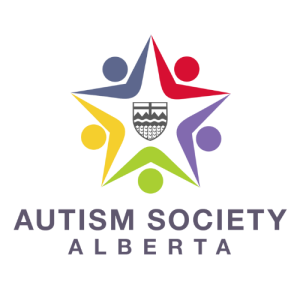
 Draw/paint with food using your fingers on a cookie tray. Try using pudding, thickened tomato sauce, condensed cream soups (don’t add water), yogurt, condiments (ketchup, mustard, mayonnaise), etc.
Draw/paint with food using your fingers on a cookie tray. Try using pudding, thickened tomato sauce, condensed cream soups (don’t add water), yogurt, condiments (ketchup, mustard, mayonnaise), etc.